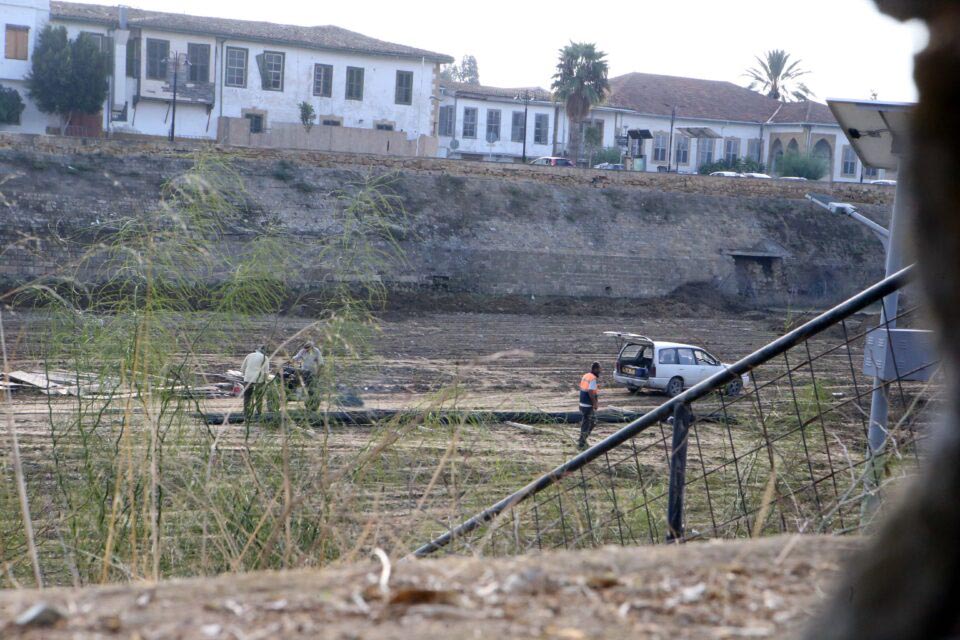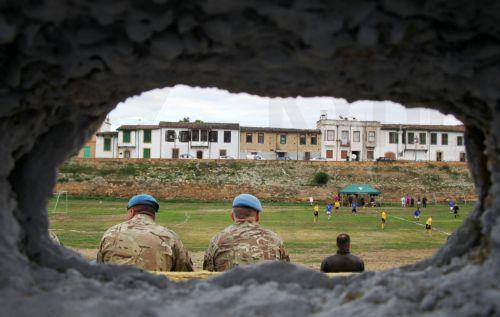Recent back and forth involving Unficyp has raised tensions
It appears recent tensions between the United Nations Peacekeeping Force in Cyprus (Unficyp) and both sides on the island have subsided for now. In what amounted to a bout by the sparring partners in the north and the south to score token points against each other, the referee ended up absorbing most of the blows.
For the umpteenth time, the UN found itself caught in the middle. On the one hand, a number of incidents of reported harassment of Greek Cypriot farmers in the buffer zone by Turkish troops, or the works at the Cetinkaya football stadium, left Nicosia unhappy with Unficyp’s handling of these matters. On the other hand, the Turkish Cypriot side tried – to no avail – to pressure Unficyp into signing a separate status of forces agreement (SoFA) with it.
In early October they gave Unficyp one month to enter into a SoFA with it. As things stand – and have done for decades – the peacekeeping force has such an agreement with the host’s authority – in this case the Republic of Cyprus, and not the unrecognised ‘TRNC’.
But the north – under nationalist Ersin Tatar – sees this as a slight to Turkish Cypriots and a sign that the north is not being treated as equals. In other words, they complain they are hosting UN troops pursuant to a formal agreement not with them, but with the Greek Cypriots.
Analysts see this as a bid by the Turkish Cypriot leadership to secure recognition for itself ‘through the backdoor’. Something which Nicosia is well aware of and vehemently opposes.
The ‘TRNC government’ intimated that unless Unficyp responded to their request, the UN would have to abandon their two outposts and contact point in the north. The one-month deadline elapsed, and nothing happened.
On November 2, just as the deadline was expiring, the north’s ‘foreign ministry’ issued a statement that looked like a face-saving exercise. While insisting it would not drop the matter for a separate SoFA, the ‘ministry’ said Unficyp could continue operating, but that this was “thanks to our good will.”
Asked via email what is the status of the north’s demand, Unficyp spokesperson Aleem Siddique told the Sunday Mail: “This matter is being handled at United Nations Headquarters, where the Turkish Cypriot request was made, and it is not closed.”
He was referring to the draft of a SoFA presented by the Turkish Cypriot leadership to the UN Secretary-General in New York in September, on the sidelines of the General Assembly.
On whether the UN could come to some arrangement accommodating the Turkish Cypriot demand, Siddique had this to say: “No current or future United Nations approach would ever violate Security Council resolutions.”
Whereas the north – unrecognised by the United Nations – cannot interfere with, nor stop, the peacekeeping force from operating in the buffer zone, they could potentially hassle and make life difficult for Unficyp in the north, opines Hubert Faustmann, professor of history and political science at the University of Nicosia.
“Given that the north has since taken a step back, clearly they don’t genuinely want Unficyp gone. Rather, the affair smacks of symbolism – an attempt by the north to gets its status upgraded.”
But he adds: “It does raise an interesting question though – can a UN peacekeeping force continue to function normally when one of the sides has a problem with it? In this sense, Cyprus might serve as a test bed for that.”
In October and early November a number of incidents were reported of Greek Cypriot farmers tending to their fields in the buffer zone and being harassed by Turkish troops. In the south this was portrayed as unusual – an escalation of the Turkish side’s attempts to dominate in what is otherwise supposed to be ‘no-man’s land’. But Nicosia complained that Unficyp – whose patrols did show up – reacted too softly to the seemingly aggressive Turkish posture.
On this, the UN’s position is that the recent spate of incidents was not out of the ordinary.
“We often see tensions rise and fall depending on what is happening inside the buffer zone. That’s why the presence of Unficyp is so important, we play a vital role in de-escalating tensions and keeping the peace,” Siddique commented.
“Unfortunately, many of these incidents have been caused by farmers entering the buffer zone without permission and crossing the northern ceasefire line despite being warned against provoking tensions. Our top priority remains the safety of civilians inside the buffer zone and that’s why it’s so important for people to follow the instructions of our peacekeepers and avoid provoking tensions while inside the buffer zone.”
Capping it all, there came the friction over the Cetinkaya football pitch inside the buffer zone, close to the Ledra Palace crossing. The Turkish side are conducting works at the venue so that it can be used for training. This infuriated Nicosia, which in late October sent a letter to Unficyp asking for an immediate postponement of the works. Nicosia was especially riled, arguing it had been kept in the dark – any construction works in the buffer zone require the consent of both sides.
On this, Unficyp’s Siddique demurred when asked directly if the Greek Cypriot side was kept out of the loop.
“We always liaise closely with the ministry of foreign affairs on issues related to the buffer zone and we are working with them to address the concerns they have raised with us,” Siddique said generically.
“Regarding the football pitch, the site will be used for football training only, as it has been used in the past, with strict regulations in place to manage its use and protect its status within the buffer zone. Any claim that the status of this location has changed is wrong and misleading; the area remains inside the buffer zone, under the control of the Unficyp.”
But the affair seemed to spiral out of proportion when Foreign Minister Ioannis Kasoulides issued a stern demarche to Unficyp. Kasoulides summoned Unficyp head Colin Stewart to his office, but as the latter could not attend, the demarche had to be delivered over the phone.
For Faustmann, the episode raises some eyebrows – particularly with the conduct of Kasoulides, who normally is quite diplomatic and restrained. According to the leaked transcript of the call, Kasoulides went as far as threatening to nix the renewal of the force’s mandate over the potential for a deal between Unficyp and the north, an unprecedented reaction from the Greek Cypriot side.
“Nicosia’s response appears over the top, especially when you consider that this was about a football pitch. Yes, strictly speaking the Greek Cypriot should have been informed of the works – that’s the protocol. But on the other hand, it’s not like the works at the stadium would give the Turkish side a strategic military advantage in the buffer zone.”
What caught Faustmann’s attention is how the Greek Cypriot side leaked the demarche to the press, presenting Kasoulides as giving Stewart an ‘earful’ during their phone conversation.
“Obviously they did this [the leak] deliberately, to make a point. And over a football pitch?”
Meantime a segment of the Greek Cypriot press piled on the Unficyp chief, accusing him of a pro-Turkish bias. An opinion piece by Costas Venizelos in Phileleftheros went so far as to suggest that Stewart had snubbed Kasoulides by not physically going to the latter’s office. According to the piece, Stewart said he was feeling unwell – but the evening before he had gone out to dinner, and the day after the phone call he flew out to Canada.
Later, journalists were asking President Nicos Anastasiades whether he’d raise the issue of Stewart with UN headquarters. He responded that the necessary steps had been taken.
“Stewart is neither the first nor the last UN official to go into the Greek Cypriots’ bad books,” offers Faustmann.
“I think what we’ve seen is just the latest example of the UN getting beat up on by both sides as they seek to score brownie points against one other. Once again the UN is the ragdoll.”
Asked whether this latest round of bickering and antics might be because nothing substantive is happening in the peace talks, so the attention has shifted to another arena – the buffer zone – Faustmann said: “Possibly.”








Click here to change your cookie preferences